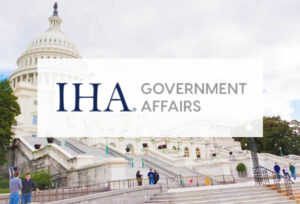On June 2, Americans for Free Trade (AFT) sent a letter to the House Select Committee on the Chinese Communist Party (CCP) signed by IHA and 145 other organizations for the May 17 hearing Leveling the Playing Field: How to Counter the Chinese Communist Party’s Economic Aggression. Despite the enmity between Capitol Hill Republicans and Democrats, the Select Committee on the…
CONTINUE READING
Government Affairs & Legal
IHA has collected a variety of resources to help members stay on top of current legal and technology issues.
Controversial New Process for Regulations
On April 6, President Biden issued the Executive Order (EO) “Modernizing Regulatory Review” that will change the process by which federal agencies such as the U.S. Environmental Protection Agency and Departments of Transportation and Labor promulgate their regulations. The White House says these changes will improve the process, but administrative law experts believe the new…
CONTINUE READINGThe Limit, Save, Grow Act of 2023
On April 26, the U.S. House of Representatives passed the Limit, Save, Grow Act of 2023 (H.R. 2811) to suspend the federal government’s debt ceiling through either March 31, 2024, or a $1.5 trillion increase when the current $31.4 trillion ceiling runs out, whichever comes first. It’s not unusual for Congress to raise the debt ceiling so Treasury can continue to sell U.S. bonds…
CONTINUE READINGProposed PFAS Standards from the U.S. EPA
The U.S. Environmental Protection Agency (EPA) has taken steps to set maximum levels for certain polyfluoroalkyl and perfluoroalkyl substances (PFAS) in public drinking-water systems, and to designate certain PFAS as hazardous substances under the Comprehensive Environmental Response, Compensation and Liability Act or CERCLA (the Superfund law). PFAS are chemicals that have…
CONTINUE READINGIHA Submits Comments to USTR Tariff Review
As required by the Trade Act of 1974, the U.S. Trade Representative (USTR) must conduct a “necessity review” of the Section 301 tariffs on some $350 billion of products from China (Lists 1, 2, 3 and 4a) or the tariffs automatically sunset after four years. However, the Trade Act is somewhat vague on how a review should be done, giving USTR a fair amount of latitude in carrying…
CONTINUE READINGSignificant Trade and Shipping Regulatory Actions
The U.S. Trade Representative (USTR) is required by statute to conduct a “necessity review” of Section 301 tariffs, which in this case concern tariffs placed on some $300-$350 billion of products from China (Lists 1, 2, 3 and 4a). Former President Donald Trump started imposing the duties in 2018 under Sec. 301 of the Trade Act of 1974, which automatically expire after four…
CONTINUE READINGLabor Relations Regulatory Update
The Biden Administration’s regulatory agenda will face Republican scrutiny in the next Congress by way of oversight hearings and a stream of information requests to agency heads between hearings from committee chairs. Administration proposals concerning labor (employee) relations will be one of the more controversial areas based on Republican concerns that they will create more…
CONTINUE READINGTariff Update
In early September, the U.S. Trade Representative (USTR) announced it had received comments from a number of entities supporting a continuation of the Section 301 tariffs on products produced in China. This culminates the first phase of USTR’s statutorily mandated “review of necessity” for Sec. 301 tariffs before they expire after four years. However, by September’s end, USTR…
CONTINUE READINGFederal Spending, Taxes, Inflation and Interest Rates
According to many economists, a major contributor to inflation in the U.S. economy is federal spending. Congress had already spent $3 trillion in 2020 responding to the pandemic when Democrats took the reins and passed the $1.9 trillion American Rescue Plan in March 2021. This was done despite warnings from economists including former Obama officials who feared more big…
CONTINUE READING- « Previous Page
- 1
- 2
- 3
- 4
- …
- 8
- Next Page »



